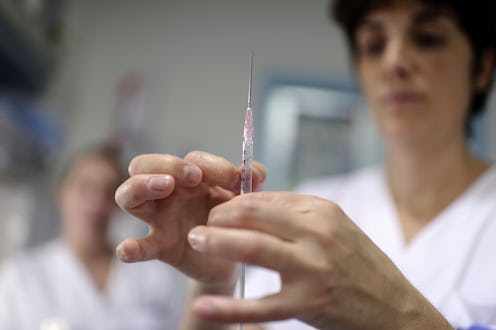News
Get Ready For A 'Female Viagra' Injection
As Sprout Pharmaceuticals ramps itself up for round two of its journey toward FDA approval, another, smaller, pharma company is throwing its hat into the ring, trying its hand (as it were) at female sexual satisfaction. Palatin Technologies, a New Jersey biotech firm, is testing its new 'female Viagra' for women with low sexual desire. From the makers of the nasal spray aphrodisiac, meet the injectable, decidedly unsexy-sounding, Bremelanotide — otherwise known as BMT.
Palatin's newest drug comes in a take-as-needed "insulin-like" syringe, to be injected into the belly or upper thigh. (Sexy!) The drug works by activating the body's melanocortin receptors, stimulating the libido, and also ups the body's levels of dopamine. The effect supposedly lasts for roughly eight to 10 hours; like other 'female viagras' before it, its side effects include headaches and flushing. (Side-note: isn't "flushing" just generally normal when turned on?)
Having succeeded in "decreasing distress, increasing arousal and desire, and increasing the number of sexually satisfying events,” during its first two clinical trials (which involved over 400 women with Hypoactive Sexual Desire Disorder), Palatin is about to start BMT in on its third and largest test. Despite the positive feedback so far, there are still quite a few hurdles to be gotten through.
“[Unlike Viagra] It’s not just simply increasing blood flow to the genitals... you also have to improve some of the neurotransmission and hormonal factors that may be contributing to their dysfunction,” David Portman, who supervised one of the trials, told the NJ Star-Ledger. “So, it’s been more of a challenge to find the compounds that may treat the constellation of causes.”
This isn't the first time efforts have been made to meet this challenge; in fact, more than once, hype surrounding the "new female viagra" has dominated headlines. Flibanserin, for example, which works on sexual desire by affecting impulses for appetite and mood, was all the rage two months ago. Sadly, the buzz is usually followed by a subdued FDA rejection, and subsequent accusations of gender inequality. In response to the possible female libido drug Lybrido (which is still being tested), for example, a researcher told the New York Times that the industry has a "fear of creating the sexually aggressive woman.”
If Lybrido does manage to get FDA approval, it could become available as soon as 2016.
While indictments against the FDA admittedly often come from Big Pharma itself — what better way to push a product than to cry sexism? — gender bias of some sort does seem to be stopping female Viagra from actually making it to the shelves. As stands, men have a handful of drugs to get them up — Viagra, Cialis, Levitra, to name just a few — and these bring in $5 billion in sales around the world every year.
Meanwhile, there are still no approved options for treating low sexual desire in women, in spite of the fact roughly 43 percent of women experience some form of sexual dyfunction. Obviously, there's a gaping whole there — but BMT, which is still at the development stage, is unlikely to fill it.
Image: Palatin Technologies
